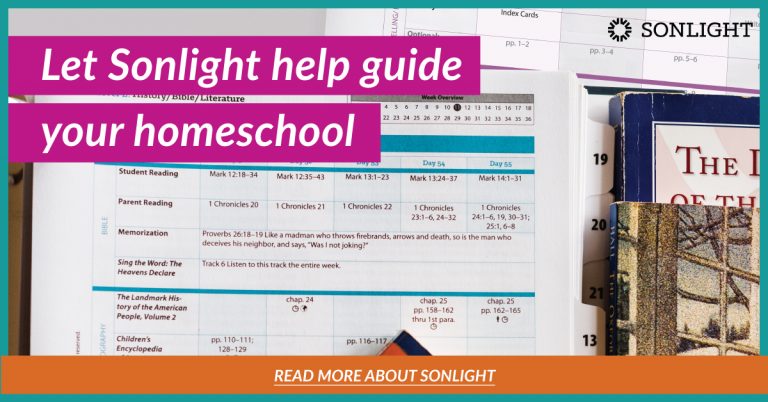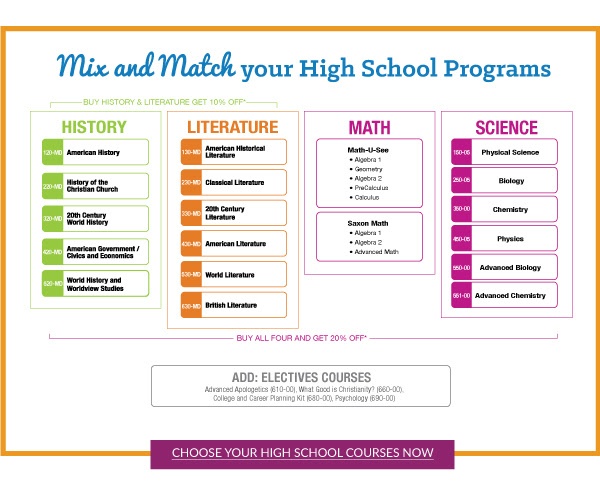As home educators, we shoulder the responsibility of ensuring our children learn to read, calculate figures and sums, and transcribe thoughts to paper. In the pursuit of these essential three Rs—reading, ‘riting, and ‘rithmetic—where do truth and beauty fit in? Is it worth spending time focusing on these so-called intangibles?
Few Christians, of course, would argue against the importance of teaching truth. “I am the truth,” Jesus reminds us in John chapter fourteen, verse six. “Thy word is truth,” He echoes in prayer to God a few chapters later. Truth is integral to the believer.
But what about beauty? It’s not definable, explainable, or logical. Why does it matter? Aren’t there more practical endeavors, and other hefty educational topics more deserving of our time and attention?
God Invented Beauty
God could have created this life to be a pragmatic and adequately functional existence, but he didn’t. He chose to create beauty, in all its seemingly-unnecessary splendor. It’s hard, sometimes, to remember in the midst of this broken and flawed world, but it’s true. God is the author of all that’s good, beautiful, and true. Genesis’ repeated refrain “and God saw that it was good” uses the Hebrew word טוֹב, which can be translated beautiful and delightful.
Have you ever thought about the passage in this way before: God saw, and it was beautiful? God saw, and it was delightful? It brings about a rather awe-inspiring, marvelous perspective, isn’t it?
I play at being creative here and there, but in reality, my personality is rather rigid. I see justice in terms of black and white, and my thoughts tend to slide toward the “all or nothing” end of the fallacy spectrum. And yet I’ve grown convinced of beauty’s absolute necessity.
God Commands Beauty
If we’ve ever felt the temptation to dismiss beauty for beauty’s sake as worldly or secular, Francis Schaeffer’s book Art and the Bible shouts to our dulled senses. In this brief but influential book, Schaeffer calls our attention to the sixth verse of second Chronicles chapter three in which Solomon, following God’s temple construction commands, “garnished the house with precious stones for beauty” [emphasis mine]. While our American sensibilities tend to shy away from such an idea, the Old Testament temple certainly doesn’t. Schaeffer expounds,
“There was no pragmatic reason for the precious stones.
They had no utilitarian purpose.
God simply wanted beauty in the temple.
God is interested in beauty.”
Isn’t this a profound realization?
We Ache for Beauty Because it’s a Whisper of What Eden Was and What Heaven is
On a long-forgotten album from the early 1990s, the late Rich Mullins sang, “There's so much beauty around us / for just two eyes to see.” I’ve always loved this lyric. It reminds me of how much we can not yet see because we’re, as Paul says “see[ing] through a glass, darkly.” And it also reminds me of how much there is yet to see, waiting for us just beyond the veil.
We ache for beauty because it’s a whisper of what Eden was, and what heaven is. All the earthly beauty we see around us—the crimson and indigo sky, the ethereal curl of a blush-tinged petal—all this is a reflection of the One who created “all things bright and beautiful,” as the old hymn says.
Beauty matters because beauty reflects God.
It matters because it points us heavenward and reminds us to fasten our eyes on the eternal.
Our longing for beauty will never be complete until we find ourselves face to face with Him whose hands crafted this all. As the great C.S. Lewis wrote, “If we find ourselves with a desire that nothing in this world can satisfy, the most probable explanation is that we were made for another world.”
Beauty is Naturally Integrated into Life
You can read all seven Sonlight book requirements here, but would it surprise you to learn beauty is actually on the list of criteria? Point six of the seven-part test reads, “[The books must be] verbally beautiful. The writing must be superb and allow for fluent reading—silently or aloud.”
It’s a fascinating point to note, don’t you think? Not only does beauty matter in the trenches of homeschooling, it’s a non-negotiable point. Beauty isn’t merely a superfluous accessory to learning, but an essential element. And this integration reflects, life, doesn’t it? Beauty is not to be relegated only to the study of arts. Worship is not meant to be segmented out into a ninety-minute chunk of Sunday morning time. Rather, when we open our eyes to the overwhelming beauty in
- all of nature,
- the lyrical rise and fall of the written word,
- the mouth-watering aroma of dinner simmering on the stove, and
- everyday moments,
we can praise God with every breath.
We are Free to Enjoy Beauty
Friend, does your heart, too, desire beauty? Don’t condemn yourself when longing for beauty swells up inside you, when your heart thrills for a basket of blooms or a metallic-rimmed mug or the sparkling sight of the evening sky beyond a just-cleaned window.
Certainly we are warned against covetousness, but we are created for beauty. As Francis Schaeffer so plainly said, “God is interested in beauty.” It’s okay if you’re interested, too! This longing is God-given, and we can honor him as we remember His realm is the opposite of chaotic darkness. (And we can wage war against discontent, too, when we intentionally seek out the hidden beauty which awaits us around unexpected corners.)
I find my heart is lifted when I embrace the freedom God granted to look around and marvel, “It is טוֹב—it is beautiful, delightful, lovely, good.” If I am tempted to focus on how much has gone wrong, my heart is prompted to praise Him when I instead turn my eyes on how much is good. (And we can train our hearts to look for the glimmer of light in the darkness when we take the time to sit down and read poetry and fiction together, too. Reading teaches us to see beauty in unexpected places.)
Won’t you join me in actively seeking the beauty around you?
To find out more about Sonlight's beautiful book-based homeschool programs, order a complimentary copy of your catalog today.



















